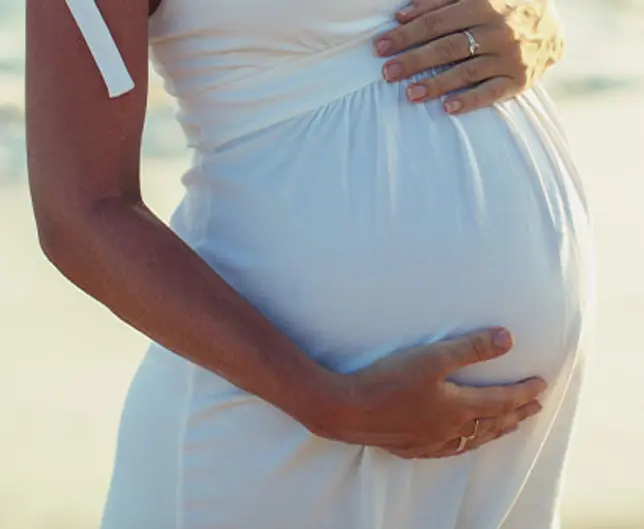Coffee and Pregnancy

Pregnancy changes everything—including the recommended daily caffeine intake. Find out what that means here.
Suitable coffees
Coffee During Pregnancy
For many, coffee is the favorite morning pick-me-up. It serves as a remedy for fatigue or stress, and the coffee break is a small escape from everyday life. However, during pregnancy, caffeine, the psychoactive substance in coffee, is controversial.
Pregnancy and childbirth are significant times in a woman's life. Changes come rushing in, and you are no longer making decisions just for yourself. Not only does your body change – your entire life does. Many couples trying to conceive and expectant parents are unaware that diet and lifestyle can influence both the child's health and their own in the long run. Awareness of caffeine consumption and an assessment of the amount consumed are therefore important. A mindful lifestyle and decaffeinated coffee can help you during this special time.
Pregnancy is also a time full of questions. We want to help by providing clarity on what to consider during your coffee breaks.

Pregnancy Changes Everything, Including Your Coffee Perception
Pregnancy changes a woman in many ways. Proper nutrition becomes a priority, and sensory perceptions shift under the influence of hormones. You may react more sensitively to certain aromas and smells. Especially during the first trimester, you perceive various aromas differently, including the aroma of brewed coffee. The coffee scent you loved in the morning before pregnancy may suddenly become unappealing.
Early pregnancy symptoms can include nausea, vomiting, and a possible aversion to coffee. Women affected by this naturally reduce their coffee consumption and, consequently, their caffeine intake. However, not all women notice the early signs of pregnancy so clearly and may unknowingly consume too much caffeine. We recommend switching to decaffeinated coffee at the first sign of pregnancy. This significantly reduces the risk of excessive caffeine intake.
Which Foods Contain Caffeine?
We have compiled a brief list of beverages and sweets that contain caffeine, helping you stay aware of which foods to consume cautiously. Throughout the day, caffeine intake adds up. It is better to drink decaffeinated coffee so that you do not have to worry about that piece of chocolate in the evening.
This list is not exhaustive, and the exact caffeine content of coffee, chocolate, or tea varies greatly depending on preparation. For coffee, factors like bean blend, grind size, and brewing method significantly influence caffeine levels.
Food and Caffeine Content
150 ml filter coffee: 50 - 100 mg
150 ml decaf filter coffee: approx. 3 mg
50 ml double espresso: 50 - 150 mg
50 ml double decaf espresso: 3 - 5 mg
200 ml latte macchiato: approx. 80 mg
150 ml cappuccino: approx. 80 mg
200 ml black tea: approx. 45 mg
200 ml green tea: approx. 30 mg
250 ml cola: approx. 25 mg
200 ml cocoa drink: 8 - 35 mg
250 ml energy drink: approx. 80 mg
100 g milk chocolate: 3 - 35 mg
100 g dark chocolate: 50 - 110 mg
Source: German Coffee Association and German Nutrition Society (DGE)
How Much Caffeine Can You Consume?
The German Nutrition Society advises pregnant women to drink caffeinated beverages only in moderate amounts and to avoid energy drinks entirely. Various studies show that regular caffeine intake during pregnancy can lead to fetal growth restrictions and lower birth weight in newborns. Studies with linear dose-response analyses indicate that every additional 100 mg of caffeine per day (about one cup of coffee or two cups of tea) during pregnancy is associated with an increased risk of reduced birth weight. This risk appears to increase linearly with higher caffeine intake.
The average birth weight of a newborn is approximately 3600 grams. Each additional cup of coffee can result in the baby weighing about 21 - 28 grams less at birth. While a slightly lower birth weight is unproblematic for healthy, full-term babies, it may lead to complications for premature or underdeveloped infants.
The European Food Safety Authority (EFSA) has issued the following recommendation: A regular daily caffeine intake of 200 mg poses no risk to fetal development. However, a single safe dose of caffeine intake for pregnant women has not been established.
The good news is that you do not have to give up your coffee moments during pregnancy if you switch to decaffeinated coffee. You can enjoy your coffee without worry. Before reaching the EFSA’s recommended daily limit, you could drink about 60 cups of decaf coffee.

How Does Caffeine Affect Pregnancy?
Even as a pregnant coffee lover, you still feel the stimulating effects of caffeine. But it is not just you who wakes up – your baby does, too. Caffeine crosses the placenta and is passed directly to the baby. Studies have detected caffeine in newborns' hair, proving that caffeine transfers unfiltered from the mother to the child. The caffeine levels found in newborn hair corresponded to the mother’s caffeine consumption during the last trimester of pregnancy.
Daily caffeine consumption in pregnant women also leads to caffeine accumulation in the baby, as neither the baby nor the placenta can break down caffeine. If you drink coffee, tea, or cola in the morning, at noon, and in the afternoon, you remain caffeinated throughout the day – even at night.
Additionally, caffeine metabolism slows down during pregnancy. Typically, a healthy coffee drinker reaches peak caffeine concentration in the blood within one to two hours. The half-life, or the time it takes for caffeine levels to drop by 50%, is usually between 2.5 to 5 hours. During pregnancy, this half-life extends and can reach up to 18 hours by the end of pregnancy. Only a few weeks after giving birth does caffeine metabolism return to normal levels.
Coffee and Breastfeeding – What Should You Consider?
Once your baby is born, sleepless nights become the norm. You may crave your morning cup of coffee, but caution is needed since caffeine also transfers to your baby through breast milk. It is not just you who feels the effects of caffeine – your baby does, too.
In healthy adults, caffeine is primarily broken down by specific enzymes in the liver. However, in newborns and infants, the liver’s enzyme system is still underdeveloped, meaning they cannot fully metabolize caffeine. In newborns, the kidneys are the main route for caffeine elimination. More than 80% of the caffeine consumed by newborns is excreted unchanged in their urine, whereas in healthy adults, only 2 - 4% of caffeine remains unchanged in urine.
Medical observations also indicate that caffeine intake through breast milk can cause restlessness, stomach pain, and bloating in infants.
During breastfeeding, the German Nutrition Society recommends a maximum daily caffeine intake of 200 mg. Additionally, nursing mothers should consume caffeinated foods and beverages only after breastfeeding. This allows the mother’s body time to metabolize caffeine before the next feeding, reducing the baby’s exposure to its effects. Decaffeinated coffee is also a safe alternative during breastfeeding for both mother and child.
Image sources: Image with Coffee blue: jeremy-yap-jn-HaGWe4yw-unsplash
Image with coffee pink: natanja-grun-X2s8GhnQmds-unsplash








